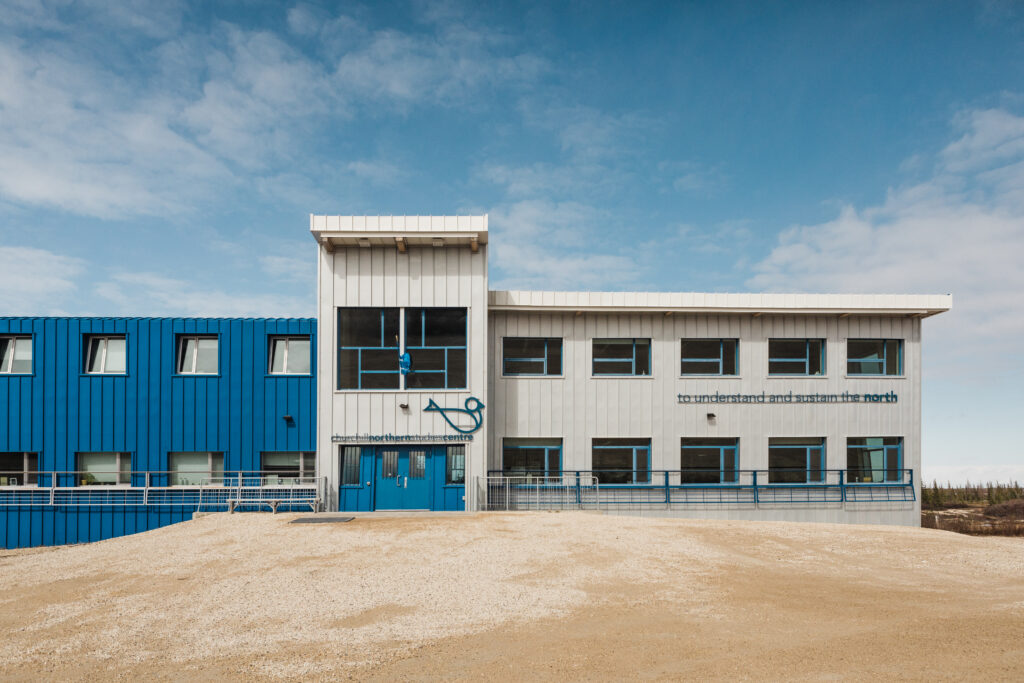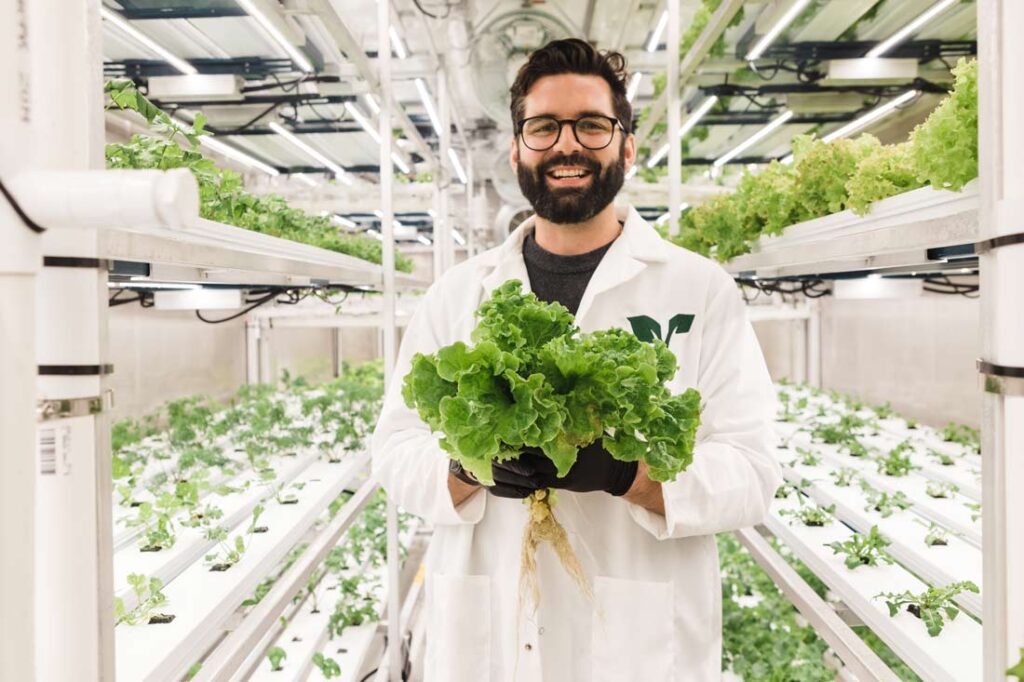The Canadian town of Churchill, located along the Hudson Bay in Manitoba’s far north, is renowned for its arctic wilderness, captivating northern lights, playful beluga whales and iconic polar bears. Situated at 58 degrees latitude, this town of extremes is home to roughly 900 year-round residents. However, the small population is more than offset by the influx of approximately 500,000 tourists who flock here throughout the year.
Amid this backdrop, a hidden gem lies in a modest shipping container just outside the town. It’s an innovative project known as Rocket Greens, spearheaded by the Churchill Northern Studies Centre (CNSC). For nearly six years, Rocket Greens has successfully demonstrated the possibility of cultivating fresh, leafy produce regardless of season or weather conditions.
Through an effort between the Northern Manitoba Food, Culture, and Community Collaborative and CNSC, 250-400 pieces of hydroponically grown greens are delivered weekly to the community. These cater to the project’s Community Supported Agriculture (CSA) subscribers, local restaurants and grocery stores, ensuring a steady source of locally grown organic produce.
The beginning of Churchill Northern Studies Centre (CNSC)
CNSC was established in 1976 as a center dedicated to providing logistical support to researchers, educators and citizen scientists interested in examining the flora and fauna of the Arctic. “In our mandate to understand and sustain the North, we try and make it as accessible as possible,” explains Dylan McCart, executive director of CNSC. The facility subsidizes rates for researchers, allowing them to stay at CNSC for their studies. The center comprises various departments that facilitate this mission by offering subsidized lodging, research laboratories, equipment and technical assistance to those seeking to conduct studies in the region. “We can subsidize that by providing educational programs to the general public,” McCart says.

Within CNSC, the Sustainability Department oversees the highly successful Rocket Greens initiative. The initiative was established in collaboration with Growcer, a company focused on promoting food sovereignty in remote communities such as Churchill.
Rocket Greens served as Growcer’s inaugural prototype unit for hydroponic plant cultivation. In 2017, Churchill faced a significant challenge when a flood disrupted the local railway line, one of only two ways of accessing the town. McCart explains that, since they had to rely on just air transportation, this caused a dramatic surge in food prices and placed a strain on the community due to inconsistent availability.
Recognizing the community’s need for a sustainable approach to food, CNSC secured funding for the Growcer project. The last ship of the season transported a unit to Churchill and operationalized within a few months. Now, this highly successful initiative provides the community with the freshest greens imaginable all year round, something Churchill never had in the past due to its climate, short growing season and soil conditions. Since then, the project has harvested and sold more than 80,000 units of fresh produce.
Churchill Northern Studies Centre and Rocket Greens are making a difference
Erin Greene, a Churchill resident since 2015, became one of the first subscribers to Rocket Greens’s CSA program when it launched in 2018.
“When I first moved here, it was very hard to get good quality fruits and vegetables…. We would never get fresh herbs and never see things like Swiss chard or kale,” recalls Greene, who says she now maintains a healthier diet and has become more self-sufficient as a result of the program. “Now, not only do I get an abundance of fresh greens, but I get them delivered with minimal plastic packaging (a huge win!) and with the knowledge that the carbon footprint is extremely low in comparison to the produce shipped from Winnipeg.”
Rocket Greens spreads its roots
Over the years, the project has expanded beyond its initial CSA subscription model. “And now [there are] different branches of the Rocket Greens project we’re able to provide to different grocery stores, to restaurants in town, and then continue with our subscription process, which happens on a weekly basis here,” McCart says.
The program also helps CNSC in its own kitchens, supporting the researchers, students, faculty, tourists and scientists who visit each month. Staff keep the walk-in refrigerator stocked with Rocket Greens and herbs grown on site, and everyone is welcome to use them for their meals.
In addition to Rocket Greens, CNSC has initiated a seeding project for community garden support. This involves planting seedlings during the late fall and early spring that are then distributed to local community members free of charge in summer. Due to the short growing season and the challenging agricultural conditions, this seeding project offers a head start.
“Community members can receive plants at no charge…. It’s an educational tool to learn how to seed properly [and] how to grow your own food… in your own home,” McCart explains.
This year’s seedling program will include a variety of crops such as squash, pumpkin, peas, corn and peppers to complement the traditional land-based foraging that is typically practiced during Churchill summers.
Recently, CNSC also built greenhouses in different locations around town. These greenhouses act as localized garden plots, further spreading its mission of helping remote communities attain food sustainability. One is located at Duke of Marlborough School. Another is part of a not-for-profit called The Warrior Caregiver Program that provides mental health and addiction support, and a third one is on CNSC premises.
Breaking down Rocket Greens
Rocket Greens offers two different types of subscriptions called “Launch Box” to cater to the needs of its customers. A standard bag is designed to feed a family of four for a week, while the mini bag is more suitable for individuals. Each bag contains a variety of fresh produce, including lettuce and leafy greens such as chard or mustard greens, as well as a selection of herbs such as cilantro, dill and mint.

Produce is packed by units within the bags, and these units are categorized by weight. The mini receives two units and standard receives four. Rocket Greens operates on a weekly harvest schedule and seeds are initially planted in a medium called rockwall, where they germinate in a nursery environment before being transferred to the hydroponic grower. Herbs are harvested on Tuesdays, while plants are cultivated, packed and delivered on Wednesdays. To ensure convenience for its members, Rocket Greens offers home delivery to its subscribers, as well as to local restaurants and grocery stores, making it easily accessible to the community. Thursdays are set aside for cleaning and maintenance.
As the Growcer unit has evolved, so have the systems used to monitor performance. Much of the maintenance and tracking can be done remotely without needing constant human intervention, further adding to the ease of use and robustness of these units. This means that weather is no longer a hindrance and, even in minus 42 degrees Celsius, greens can be grown inside the container.
Community members are proud to be supporters
Ptarmigan, one of the town’s newest year-round restaurants, is one of the recipients of Rocket Greens’ weekly produce delivery. Owned and operated by Frontiers North, a local adventure outfitter, the restaurant is managed by chef Yves Page. Page oversees all culinary operations, including the restaurant and seasonal pop-ups such as the Tundra Pub, Dan’s Diner and the Tundra Buggy Lodge during tourist season.
Page recalls that when he first started with Frontiers North in Churchill, there wasn’t much of a food footprint. “[It] was… kind of average, kind of not-so-healthy food options up here. We made a decision quite a while ago to be that other option…, making sure we have vegetarian and vegan options, gluten-free [and] incorporating whatever we can from vendors up here,” Page adds. Once the company decided to support the community by sourcing local ingredients, it opened up avenues to promote food sovereignty in Churchill.
Ptarmigan actively gets supplies from local producers—jams from a maker in the town, coffee and meats from Winnipeg—and the addition of Rocket Greens has enhanced the restaurant’s ability to incorporate fresh greens and herbs into its dishes throughout the year. “[We] make sure every guest, when they come through [the lodge], we always give them a Rocket Greens salad. And we give them a little insight into why we use it [and how we] help the community,” Page says.
Page expresses pride in supporting the Rocket Greens initiative and eagerly anticipates an expanded and more diverse selection as the program continues to thrive. The collaboration between Rocket Greens and Ptarmigan reflects their shared commitment to promoting locally made goods and providing the community with fresh, sustainable and flavorful options.
Churchill Northern Studies Centre and Rocket Greens have created a community
The community has many avid supporters who are drawn to Rocket Greens for several compelling reasons. Firstly, the project offers food sovereignty, allowing individuals to know exactly where their food is sourced from. Secondly, it ensures food security by providing a consistent supply of fresh greens weekly. And lastly, the exceptional food quality of hydroponically grown produce is highly appealing, as it is organic and free from chemicals or pesticides.
McCart expresses his pride in the remarkable achievements of Rocket Greens for making such a tangible difference in the community, particularly considering the challenges of operating in a remote location like Churchill: “We were one of the first ones to be able to do it, so it’s great that we were able to have that vision at that time. And it’s still successful today.”
Photos by ©KARTHIKAGUPTA.COM/Courtesy of Rocket Greens.










